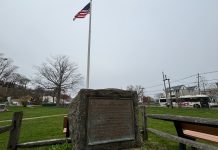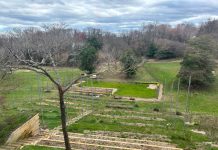Accreditation awarded by Land Trust Accreditation Commission
MIDDLETOWN – Monmouth Conservation Foundation has achieved land-trust accreditation from the Land Trust Accreditation Commission, an independent program of the Land Trust Alliance.
“Monmouth Conservation Foundation’s accredited status demonstrates our profound commitment to ensuring a permanent legacy of land conservation throughout Monmouth County to benefit all our lives and the lives of generations to come,” said Bill Marraccini, the foundation’s president. “Our land trust is an even stronger organization today having gone through the rigorous accreditation program.”
The conservation foundation was awarded accreditation this month and is one of only 254 land trusts from across the country that are currently accredited.
Accredited land trusts are authorized to display a seal indicating to the public that they meet national standards for excellence, uphold the public trust and ensure that conservation efforts are permanent. The seal is a mark of distinction in land conservation.
“This round of accreditation decisions represents another significant milestone for the accreditation program; the 254 accredited land trusts account for more than half of the 20,645,165 acres currently owned in fee or protected by a conservation easement held by a land trust,” Commission Executive Director Tammara Van Ryn said. “Accreditation provides the public with an assurance that, at the time of accreditation, land trusts meet high standards for quality and that the results of their conservation work are permanent.”
Each accredited land trust submitted extensive documentation and underwent a rigorous review. “Through accreditation land trusts conduct important planning and make their operations more efficient and strategic,” Van Ryn said. “Accredited organizations have engaged and trained citizen conservation leaders and improved systems for ensuring that their conservation work is permanent.”
According to the Land Trust Alliance, conserving land helps ensure clean air and drinking water; safe, healthy food; scenic landscapes and views; recreational places; and habitat for the diversity of life on earth. In addition to health and food benefits, conserving land increases property values near greenbelts, saves tax dollars by encouraging more efficient development, and reduces the need for expensive water filtration facilities. Across the country, local citizens and communities have come together to form more than 1,700 land trusts to save the places they love. Community leaders in land trusts throughout the country have worked with willing landowners to save over 47 million acres of farms, forests, parks and places people care about, including land transferred to public agencies and protected via other means. Strong, well-managed land trusts provide local communities with effective champions and caretakers of their critical land resources, and safeguard the land through the generations.
“Since its founding, Monmouth Conservation Foundation has been steadfast in its overall land preservation mission. The accreditation from the Land Trust Accreditation Commission is an important validation of that mission. We are gratified to be accredited and to meet the national quality standards established by the land conservation community,” said Bill Kastning, the foundation’s executive director.
Founded as a 501 (c) (3) in 1977 by Michael Huber, Judith Stanley and a small group of dedicated visionaries, Monmouth Conservation Foundation is Monmouth County’s only countywide land trust.
To date Monmouth Conservation Foundation has directly preserved more than 6,500 acres. Saving invaluable farmland and open space, protecting waterways, preserving ecosystems, creating and/or extending parks and greenways is Monmouth Conservation’s ongoing mission.
From the onset the organization has believed protection of the “natural infrastructure” is vitally important, beneficial not just for wildlife, but for citizens, towns, cities and local and state economies. The benefits and overall impact are literally incalculable.
The preservation of the Coe Estate is an example of an especially exciting open space and historic preservation project spearheaded by Monmouth Conservation Foundation; it exemplifies a myriad of important shared purposes. Its preservation directly impacted an underserved group of citizens, a town and the local economy while also benefitting the preservation of a breathtaking piece of property and a historic home. Although many roadblocks arose along the way, a shared vision and strong belief in the environmental and societal merits of the project kept it alive to see it indefinitely preserved.
As partners, Monmouth Conservation Foundation, Middletown Township and NY/NJ Baykeeper were interested in preserving open space and natural resources for the public to enjoy.
The Coe property is located in MCF’s Navesink Highlands Greenway Project Area, an expansive greenway of open space in one of the most densely populated areas of the county. A historic home on Sleepy Hollow Road, Middletown, the estate is situated on 25 park-like acres with the McClees Creek, an important tributary of the Navesink River running through it, was the ideal project.
Impact OASIS (Improving Middletown’s Program for Autistic Children Together/Ongoing Autistic Success In Society) is a nonprofit organization whose mission is to promote inclusion and acceptance of autistic individuals into their local communities. It was interested in using the Coe property in a productive, regenerative, and environmentally responsible manner while addressing the needs of the ever-increasing number of young adults afflicted with autism.
The property serves as a Transitional Residential/Adult Independent Living Center (TRAIL Center) with an agriculture focus on fostering independent living and developing social, vocational and recreational skills while in a supportive environment. Impact OASIS regularly invites the public to visit its farm stand, bread shop, library and tea room, all of which are run by young adults with autism and nonprofit coworkers. Through these interactions their students and the community have come to realize the interdependence of all human beings and the value of caring for each other and the earth.
Working with a number of partners, the foundation has also collaboratively, preserved more than 16,000 acres throughout Monmouth County.














